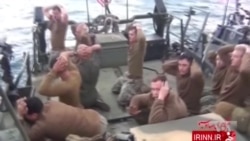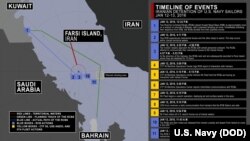The detention of 10 U.S. sailors by the Iranian Revolutionary Guard Corps earlier this year was “wholly preventable," according to the commander of naval forces in the Middle East.
In Navy documents released Thursday, U.S. Navy Vice Admiral Kevin Donegan, Commander of US Naval Forces Central Command, said the January incident was due to several problems, including poor leadership, a “non-existent” compliance with proper maintenance and procedures and insufficient planning.
“Considering the lack of discipline and failure to adhere to the basic core values of the United State Navy, it is simply good fortune that prevented an earlier incident in this unit,” Donegan wrote in his endorsement of a report on the incident.
Chief of Naval Operations Admiral John Richardson told reporters at the Pentagon Thursday the Iranian Revolutionary Guard Corps also was at fault.
"The investigation concluded that Iran violated international law by impeding the boats' innocent passage transit," Richardson said.
He added the Iranians had violated sovereign immunity by "boarding, searching and seizing the boats and by photographing and videotaping the crew."
The sailors, nine men and one woman, were traveling through the Persian Gulf from Kuwait toward Bahrain in two riverine vessels on January 12, 2016, when U.S. controllers lost contact with them.
According to the report, the boat crews started their mission hours behind schedule and, in an effort to make up time, committed an “unplanned and unauthorized deviation” that “caused them to transit unknowingly through Saudi Arabian territorial seas and through Iranian territorial seas.”
The report found that one of the boats suffered an “engine casualty” and went “dead in the water” about three kilometers away from Farsi Island, Iranian territory that is roughly midway between Kuwait and Bahrain. The sailors then failed to report the engine problems and the sighting of unpredicted land to authorities despite having working communication gear on one of the boats.
Iranian Revolutionary Guards who patrol the Gulf boarded the U.S. vessels and detained the crew members near Farsi Island. They were released the next morning.
The report found that some crew members did not meet the Navy's code of conduct standards while in custody. It said some sailors, while detained at gunpoint, had shared sensitive information, such as phone and laptop passwords.
"Those sailors clearly know our actions on that day in January and this incident did not live up to our expectations of our Navy," Richardson said.
He said the task force commander, the commanding officer of the riverine squadron and the officer in charge of the detachment in Kuwait have all been relieved of duty following the incident. Six additional sailors are in the process of potentially receiving disciplinary action.
The report recommends the Navy take steps to increase oversight of actions that move across multiple areas of operation. It has also increased the amount of training required for these missions, including escape training.
After the incident, U.S. Secretary of State John Kerry said the resolution was a success for diplomacy, and Defense Secretary Ash Carter said he was grateful to have the service members “back in our hands.”






